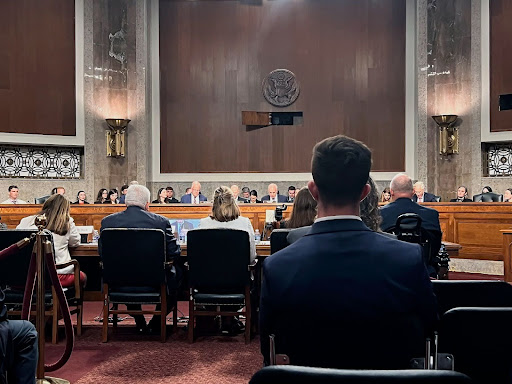WASHINGTON, June 5 (UPI) — On the eve of the 80th anniversary of D-Day, Senate committees on aging and veterans’ affairs examined vets’ services and questioned the quality of U.S. Department of Veterans Affairs caregiver support programs during their first joint hearing Wednesday.
“We cannot claim to be the greatest country in the world if we do not have the greatest caregiving in the world, and that includes supporting the military families and their paid caregivers,” said Sen. Bob Casey, D-Pa., chair of the Special Committee on Aging.
According to Sen. Jerry Moran, R-Kan., ranking member of the Senate Committee on Veterans’ Affairs, almost half of the VA patient population is over 65, and a significant number of those veterans want to live at home surrounded by their families rather than transitioning to a nursing home.
Army veteran Peter Townsend agreed with him.
“Our goal has been, and will continue to be, to create an environment that allows me to live in our home as long as possible and to avoid the need for long-term care,” Townsend said. “Participation in the VA Caregiver Program helps us to achieve that goal.”
The VA offers two programs to support caregivers: General Caregiver Support Services and the more beneficial Comprehensive Assistance for Family Caregivers. The latter provides caregivers with health insurance, mental health counseling and a monthly stipend.
However, according to Andrea Sawyer, the advocacy director at the Quality of Life Foundation, implementation of the Comprehensive Assistance program requires significant changes, since the VA regulations for evaluating veterans and their caregivers leave many of them unqualified.
“One of the problems is the language that VA created around ‘each and every’ time with [activities of daily living] assistance. It prevents the veterans from showing any independence at all,” Sawyer said.
Townsend, whose application to the Program of Comprehensive Assistance was denied, concurred. He said he has multiple sclerosis and experiences significant difficulty with mobility, fatigue and cognition, but the symptoms are highly variable and unpredictable.
The VA considered his case as not requiring assistance with the activities of daily living ‘each and every’ time they are performed, he testified.
“My concern is that because of this current interpretation by the VA of the eligibility criterion for the Program of Comprehensive Assistance, many other veterans like me and their caregivers are being denied access to this extremely valuable program,” Townsend said.
Navigating the VA system and applying for programs is only one of the challenges caregivers face, noted Casey, who added that caregivers are mainly women.
“Caring for a loved one can place a significant physical, emotional and financial stress,” he said.
Moran added that often caregivers are “overlooked and forgotten.” Nearly 40% of post-9/11 caregivers meet clinical criteria for major depression, and only those enrolled in the Comprehensive Assistance program are eligible for mental health services.
“There are community functions [in the Comprehensive Assistance program] where they host [opportunities] for caregivers to interact with each other, to meet other caregivers, and that allows caregivers to feel less isolated,” said Hannah Nieskens, a caregiver of post-9/11 veteran.
Sen. Angus King, I-Maine, emphasized that expanding community-based services and VA caregiver support programs would benefit veterans, their caregivers and the government.
“Home care is … preferred and … cheaper. We should be encouraging it,” he said.



